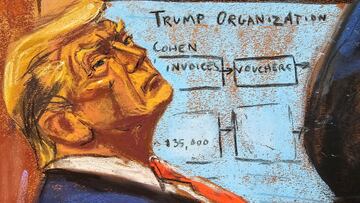Have the Secret Service and NY Department of Corrections discussed Trump going to jail?
Donald Trump is awaiting the jury’s verdict on the 34 felony counts he is facing in New York which could carry up to four years in prison for each.

The jury in Donald Trump’s hush money trial in New York will be given instructions for deliberations on a verdict this Wednesday. The twelve members must reach a unanimous decision on whether he is guilty or innocent, otherwise it would result in a hung jury.
While he has pled not guilty, should they find the former president guilty on any or all of the 34 felony counts, Trump could be facing up to four years in prison and a $5,000 fine for each. The idea of incarcerating the former occupant of the White House, who has Secret Service protection for life, has opened up several questions about the feasibility of Trump serving time behind bars.
Have the Secret Service and NY Department of Corrections discussed Trump going to jail?
Despite an explosion of posts across social media that the Secret Service has met with the New York Department of Corrections to make arrangements for that possibility based on reporting from CBS News, there has been no formal statement of any such discussions. The article in question cites a source in the NY corrections who believes it’s a possibility that preparations have been made.
Former Manhattan prosecutor Duncan Levin told the outlet that just in case the former president is given jail time that officials must have a plan in place. That’s because Trump “could be remanded on the spot,” according to Levin. However, while not out of the question, Judge Merchan has called it a “last resort” when that possibility was brought up as he reprimanded Trump for violating the gag order imposed on him.
As for sentencing, it will be up to the Judge Merchan to decide what the punishment shall be. Levin thinks that house arrest, followed by probation could be appealing for the jurist overseeing the trial who doesn’t want to be seen as interferring with the 2024 election in which Trump is the presumptive nominee.
Related stories
A recent analyst carried out by Norman Eisen looked at scores of cases where falsifying business records in the first degree was the most serious charge at arraignment. Of those he found that roughly one in ten resulted in a term of imprisonment.
However, typically they involved other charges besides only where falsifying business records. In the case of Trump, all 34 counts are related to that crime, which is normally a misdemeanor, but since they were committed in an effort to interfere in the 2016 election results they were bumped up to felonies.



Complete your personal details to comment